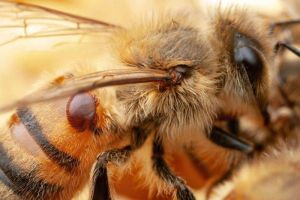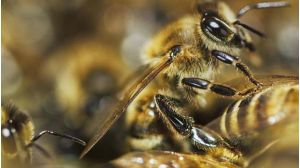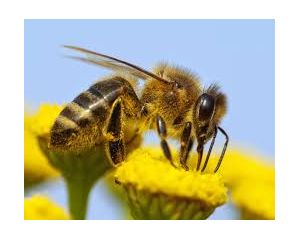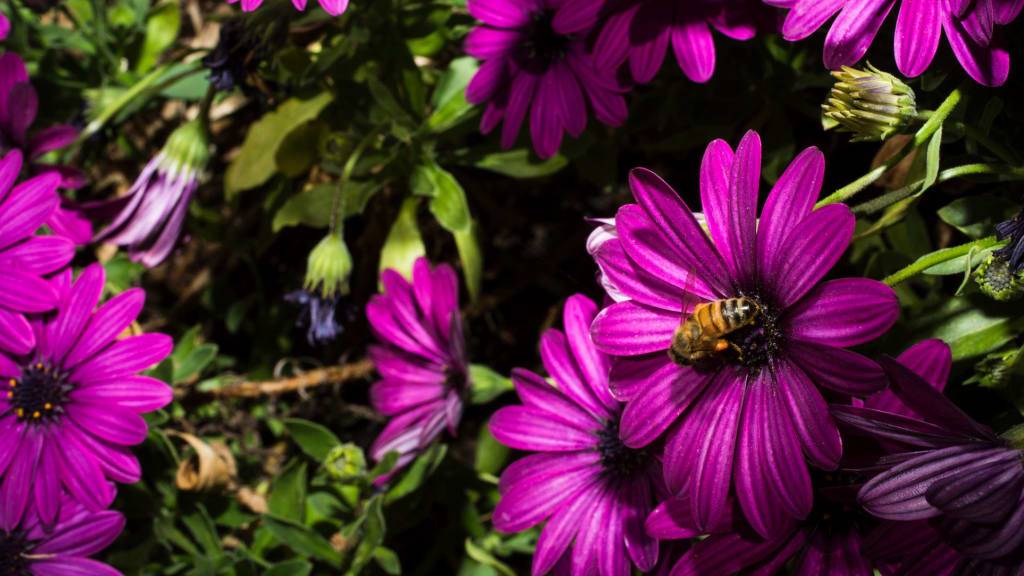The ancient Romans kept geese as guard animals.
My wife's family kept bees.
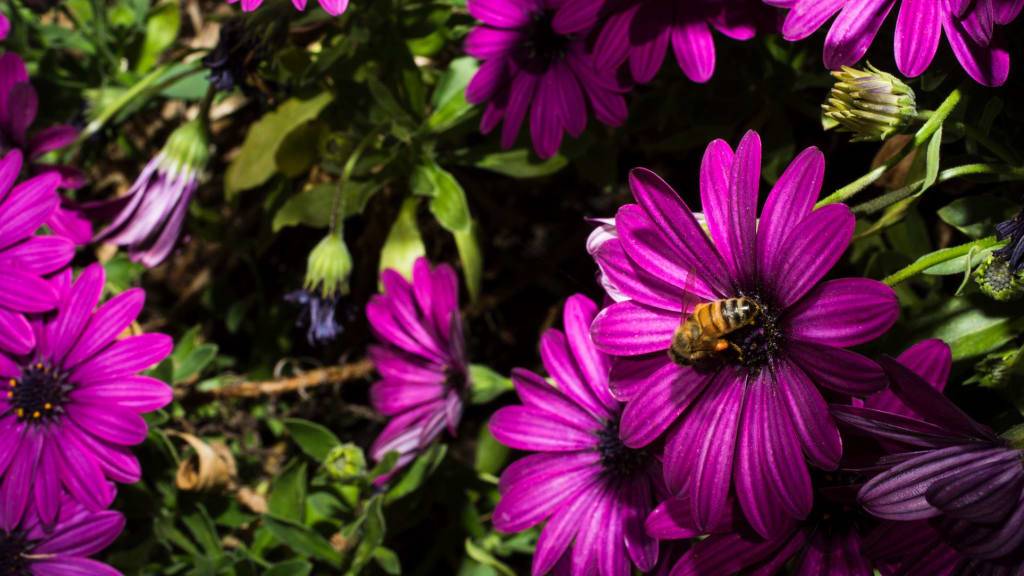
The welcome sight of a Sydney bee.
Photo: Dominic Lorrimer
Their old family home didn't have much of a fence, but it was protected from intruders by the hive in the backyard. My wife's aunt introduced her to the bees as a child. She has felt safe around bees ever since.
In turn, the bees seemed to "know" my wife. Do bees recognise individual human faces? Recent studies suggest that they do. She could safely play in the backyard as the bees buzzed in the background.
When I was growing up, bees were everywhere: in the backyard, in the schoolyard, at the swimming pool. We left them alone and they left us alone, even when they dived for our Icy Poles. Yet I always knew they were special.
Like cicadas – such as the rare black prince, which according to schoolyard legend you could sell to your local chemist for $100 – bees were magical marvels of the insect world.
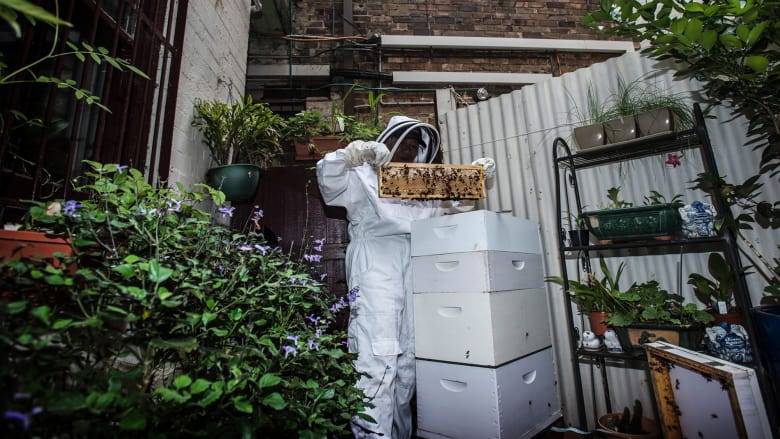
Sydney has seen a surge in urban beekeeping. Photo: Steven Siewart
Famous beekeepers such as Aristotle, Napoleon and, more latterly, Scarlett Johansson, believed bees were magical, too.
Once we were a "planet of the apiarists" (sorry: bee lore is rich with puns).
Yet today, after millennia of successful interaction with humans since caveman times, bees seem to be in retreat.
Colony Collapse Disorder has wiped out billions of bees around the world. Fingers have been pointed at the three Ps: poisons (such as neonicotinoid insecticides), parasites and people. Some even believe mobile phones and Wi-Fi are to blame.
Honey bees have unwittingly entered the beauty contest of creatures, where we only save the ones that charm and amuse us or we can sell in chocolate effigy at Easter. We laugh and weep sentimental tears at Jerry's Seinfeld's Bee Movie as all the while in real life a species that has given us so much and asked for so little in return is threatened with extinction.
Many of the world's crops rely on pollination, with one-third of every bite we eat dependent on an insect pollinator such as bees.
But some are fighting back. The "beevolution" has begun.
Sydney itself has seen an "explosion" in urban beekeeping, with a 20 per cent increase in recreational beekeeping in two years, and councils such as Ku-ring-gai selling beehives. From Millers Point to the Southern Highlands, from Fairlight to the Blue Mountains, "beevangelists" have answered the call. Beekeeping has become the "bees knees" of backyard hobbies (even if bees don't have knees, just articulated legs).
It's not just individuals, either. Parliament House in Canberra has hives. The Wayside Chapel in Kings Cross has hives.
And the Royal Botanic Garden has hives. They're kept away from the public, but what you can visit there is one of Sydney's most underrated attractions, the Calyx and its beautiful Pollination Wall. Standing at six metres high and consisting of more than 18,000 plants, this living artwork reminds us that 75 per cent of the world's crops rely on pollination, with one-third of every bite we eat dependent on an insect pollinator such as bees.
There have been 'honey wars' in New Zealand complete with violence, theft, and bee murder.
Seeing the giant bee mobiles floating above me, I feel a great swell of gratitude towards these noble insects.
The many flowers remind me of William Blake's poem, Auguries Of Innocence: "To see a world in a grain of sand/And a heaven in a wild flower/Hold infinity in the palm of your hand/ And eternity in an hour."
The next step in my odyssey is to attend a beekeeping course at the University of Sydney's Centre For Continuing Education, led by lecturer Judith Sleijpen.
The stated objectives of my classmates vary. Some want to create hives or already have their own. Some have properties out in the country, ideal for tending hives without worrying whether the bees will bother neighbours (apparently a problem with having hives in the city). Some might even be hoping to make some money from honey, beeswax candles or cosmetics.
Most are concerned about declining bee numbers and want to do their part to help. Yet I suspect we all share a love of the noble honey bee, which is absent from the room due to OH & S reasons.
I learn many interesting things in Sleijpen's class. I learn about the vital role of the queen in the colony (did you know you can order queen bees by mail?). I learn how bee scouts tell the other bees where to find nectar and flora through the medium of dance.
I learn about the purported health benefits of royal jelly, such as easing the symptoms of arthritis, encouraging hair growth, treating skin irritations and even improving sexual performance.
I learn that there is money in that liquid gold: which is perhaps why there have been "honey wars" in New Zealand, complete with violence, theft and bee murder.
I learn about the history of beekeeping, legislation (if you own a hive you have to tell the Department of Primary Industries), the different types of bees and how to extract honey. I learn about the types of hives, such as the Langstroth hive favoured by traditionalists and the recent Australian invention of the Flow Hive.
Most of all I learn that beekeeping is a patient art, not just undertaken because you occasionally want some honey on your toast.
It requires dedication to continually monitor the hive and keep the queen, drones and workers safe from pests and problems.
In its quiet way, beekeeping is almost a loving ritual.
Sleijpen flashes up on the screen a quote by Albert Einstein that puts everything in perspective: "If the bee disappeared off the surface of the globe, then man would only have four years of life left. No more bees, no more pollination, no more plants, no more animals, no more man."
Perhaps bees are good for more than candles, mead, beard wax for hipsters or honey.
Perhaps they are good for our soul. Perhaps they are good for reminding us of what we once knew – that we are creatures of the earth just like they are, sustained by the same planet and nourished by the same sun. That if one part of nature suffers we all suffer. That we are linked together in the cycle of life, a connection we have forgotten in a world where all our food is processed and our interactions electronic and online.
Maybe that's what we should be all abuzz about.

